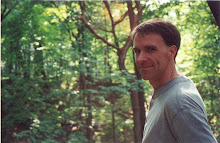Boston, MA: Very Very
Boston was a key town in the anti-slavery movement, and the Black Heritage Trail (an alternative to the more famous Freedom Trail) wends past the former middle-class homes of successful pre-emancipation free blacks, including Uncle Tom author Harriet Tubman's house and the first school for blacks, the African Meeting House. There, I asked the guard about Hopperesque isolation. His name was Richard, but it might as well have been randy: red hair stuck out in all directions from his head, and auburn stubble rambled across his chubby cheeks below eyes glinting like knife blades. My friend Julie who had moved to Boston from Chicago the year before warned me that everybody here seemed "very very: whatever they are, they are intensely." The young guard was (luckily for me) very, very opinionated about Hopper and isolation.
"That's an interesting thesis," he began, reminding me that Boston was also a college town. "We are isolated in the U.S., and Boston is one of the worst places for it. I sympathize with people who come here and talk about how mean, how downright mean, Bostonians can be. They're grumpy. Bostonians cut you off in traffic, and it's true road rage, in that it's inward. If you cut someone off in New York, at least they'll scream at you. People here don't even look at you. I'm someone who looks people in the eye and says hello when I pass and is suspicious of someone who doesn't, but I've given up trying because people on the train give me dirty looks.
"I think a lot of people look at Hopper's paintings and feel isolated for reasons having nothing to do with Hopper's motivation for painting. I see Hopper painting the Depression. He's painting the development of the city, modernism. In the 1920s and '30s, a lot of New England was small-town: frumpy guys in fedora hats alone filling up their cars with gas, and beautiful blondes who are all lonely and depressed. I see Hopper's characters as obviously disturbed. I wonder if people originally saw his paintings as pretty.
"What's great about Hopper's paintings is what they don't have: no glass in the windows, no cars, no trash. You could eat off of that street. In his one of people fully dressed in suits,  they're just baking! It's a harsh, awful light. There's no atmosphere. It's like those pictures of Buzz Aldrin on the moon, just direct shadow."
they're just baking! It's a harsh, awful light. There's no atmosphere. It's like those pictures of Buzz Aldrin on the moon, just direct shadow."
In closing, he noted, "We could be in a Hopper painting right now. It's perfect light for him." I looked up to see a cloudless November sunset descending on the narrow streets outside. His lamp-lit desk stood out in the otherwise dim entryway of this historic building. "If he was painting you and me talking, he'd be out there, and the night would be surrounding the building and there'd be a little bit of light around us. He'd be looking in and it'd just be you, a person talking, looking at something else."
20081127
74 Boston: Very Very
Subscribe to:
Post Comments (Atom)




No comments:
Post a Comment